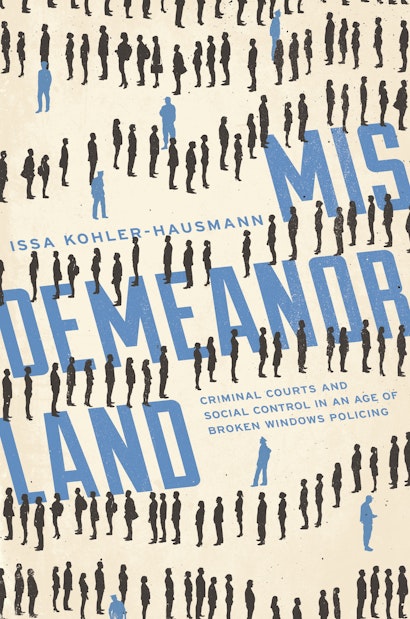Felony conviction and mass incarceration attract considerable media attention these days, yet the most common criminal-justice encounters are for misdemeanors, not felonies, and the most common outcome is not prison. In the early 1990s, New York City launched an initiative under the banner of Broken Windows policing to dramatically expand enforcement against low-level offenses. Misdemeanorland is the first book to document the fates of the hundreds of thousands of people hauled into lower criminal courts as part of this policing experiment.
Drawing on three years of fieldwork inside and outside of the courtroom, in-depth interviews, and analysis of trends in arrests and dispositions of misdemeanors going back three decades, Issa Kohler-Hausmann argues that lower courts have largely abandoned the adjudicative model of criminal law administration in which questions of factual guilt and legal punishment drive case outcomes. Due to the sheer volume of arrests, lower courts have adopted a managerial model—and the implications are troubling. Kohler-Hausmann shows how significant volumes of people are marked, tested, and subjected to surveillance and control even though about half the cases result in some form of legal dismissal. She describes in harrowing detail how the reach of America’s penal state extends well beyond the shocking numbers of people incarcerated in prisons or stigmatized by a felony conviction.
Revealing and innovative, Misdemeanorland shows how the lower reaches of our criminal justice system operate as a form of social control and surveillance, often without adjudicating cases or imposing formal punishment.
Awards and Recognition
- Winner of the Herbert Jacob Book Prize, Law and Society Association
- Winner of the Albert J. Reiss Distinguished Scholarly Publication Award, Crime, Law, and Deviance Section of the American Sociological Association
- Winner of the 2019 Mirra Komarovsky Book Award, Eastern Sociological Society
- Finalist for the 2018 C. Wright Mills Award, Society for the Study of Social Problems
"Misdemeanorland is going to be the must-read criminal justice book of 2018."—Chris Hayes
"Kohler-Hausmann, who worked as a criminal defense lawyer in New York, peppers her book with surprising statistics and case histories drawn from her field work and interviews. She raises intriguing questions, both as a legal scholar and as a concerned citizen. . . . [An] eye-opening account of the criminal justice system’s often overlooked creaky gears. . . . For anybody the least bit concerned about the subject, however, it is a worthwhile read."—Sam Roberts, New York Times
"While there has been much attention paid to the overt ways that our criminal-justice system has affected poor communities of color—both on the front end (policing) and on the back end (mass incarceration)—less attention has been directed toward what happens in the middle, when people are funneled through a confusing, bureaucratic court system that is designed to address minor crimes. Issa Kohler-Hausmann, a professor of sociology and law, helps bring this middle zone into focus in her new book, Misdemeanorland: Criminal Courts and Social Control in an Age of Broken Windows Policing. As she compellingly demonstrates, just as the police and prisons play a central role in broken-windows policing, so, too, do the courts."—Clio Chang, The Nation
"Rarely does a book come along that changes minds and transforms understandings. This is one of them. It is theoretically rich, methodologically sophisticated, and substantively challenging. Readers, whether experienced criminal justice practitioners or sophisticated scholars, will come away with new insights about what they thought they knew. Quite simply, Misdemeanorland is one of the best books ever written on courts, criminal or otherwise."—Malcolm M. Feeley, author of The Process Is the Punishment: Handling Cases in a Lower Criminal Court
"For those of us who grew up believing that ‘the process is the punishment,’ Kohler-Hausmann’s study of New York City’s singular misdemeanor justice system makes clear that the costs of low-level criminal justice processing can be devastating to people even when conviction rates are low. There is much to learn here for both academics and practitioners."—Tracey Meares, Yale Law School
"Somewhere between stop-and-frisk and mass incarceration stands the misdemeanor court, where millions of Americans spend months waiting to answer for the low-level arrests that are now part of life in poor communities of color. Issa Kohler-Hausmann takes readers on a tour of Misdemeanorland, where justice is overwhelmed by massive caseloads and a grinding bureaucracy that takes little notice of the ordinary lives disrupted and sometimes upended by the powers of arrest and incarceration."—Bruce Western, professor of sociology at Harvard University and codirector of the Justice Lab at Columbia University
"In this capacious book, criminal defense attorney, sociologist, and legal scholar Issa Kohler-Hausmann takes us inside New York City's lower criminal courts. She shows that, instead of deciding guilt and innocence and meting out appropriate sentences, misdemeanor courts largely manage people through record keeping and procedural hassle. As a result, people accused of minor crimes come to experience the justice system as arbitrary and dysfunctional. Novel and deeply researched, Misdemeanorland is a major contribution from a brilliant mind."—Matthew Desmond, Pulitzer Prize–winning author of Evicted
"With vivid, compelling ethnographic detail, Kohler-Hausmann provides an original examination of the rise of Broken Windows policing in New York and its consequences for those brought to court on low-level charges. Misdemeanorland is a critically important work of scholarship."—Mona Lynch, author of Hard Bargains: The Coercive Power of Drug Laws in Federal Court
"Powerful and compelling. Misdemeanorland is destined to make a profound and enduring contribution to our understanding of the causes and consequences of the historic expansion of the American criminal justice system."—Becky Pettit, author of Invisible Men: Mass Incarceration and the Myth of Black Progress


